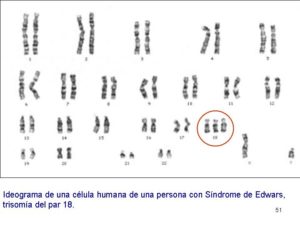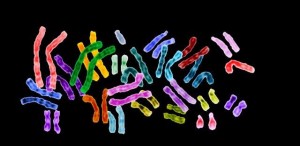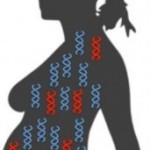A Very Special Birthday for a Young Man with Trisomy 18

On September 10, Donnie Heaton will celebrate his 21rst birthday. But unlike most 21-year-olds, Donnie weighs only 55 pounds. He is one of the oldest known individuals to have trisomy 18 (Edward syndrome). Each of his cells has an extra chromosome 18. One in about 6,000 newborns has the condition.
Trisomy 18 was in the news during the last presidential election because Rick Santorum’s young daughter Isabella has it. Her mom was 48 when she gave birth to Isabella in 2008; Donnie’s mom was 42 when he was born. The risk of producing an egg with an extra chromosome increases with maternal age.
I use a rather dire case to illustrate trisomy 18 in my human genetics textbook, a boy who died at age 22 days. And Google images pulls up photos of fetuses who never made it.
I’ve only encountered trisomy 18 a few times in genetic counseling, when the extra chromosome turned up with prenatal testing in women of “advanced maternal age” — over 35. Those cases ended with termination of pregnancy, either naturally or by choice. We called in a clergyperson for one case who candidly said he’d end the pregnancy, so bleak was the prognosis. In another case a couple had lost a child at 4 months, and the effect had been devastating on their then-preschooler, who lost his baby brother. Pregnant a third time, the couple wanted amniocentesis to avoid having another baby with the condition, although the empiric recurrence risk is only 1 in about 100.
A trisomy isn’t inherited; the extra chromosome is an accident of meiosis, a chromosome pair that doesn’t part as gametes form but instead overloads a fertilized egg. Technically this is called non-disjunction, and it just happens – it isn’t anyone’s fault.
PRENATAL TESTING
Today, thanks to cell-free fetal DNA testing (aka non-invasive prenatal diagnosis), many patients can avoid the slight risk of amniocentesis and chorionic villus sampling and find out about the more common autosomal trisomies (13, 18, and 21). Fetal DNA floats around in the maternal circulation in pieces smaller than the mom-to-be’s, so it can be separated and compared. If chromosome 18 pieces outnumber pieces of other chromosomes by half, trisomy 18 is at hand.
The first two renditions of this type of test – Harmony and Materni-T became available in 2011, to a flurry of headlines. At the end of 2012, the American College of Obstetricians and Gynecologists gave the tests a thumbs-up, so far only for high-risk women who’d otherwise have more invasive testing. But further research may soon clear it for everyone. Shortly before that, DNA Science blog explained how pregnant women’s bloodstreams harbor fetal DNA.
Prenatal testing has become so pervasive that perhaps we lose sight of the fact that the detectable medical conditions are variable. Not all fetuses, newborns, and toddlers lose the battle with trisomy 18. Not everyone chooses to avoid the birth of a child with trisomy 18, and not everyone chooses prenatal diagnosis.Karen Heaton, Donnie’s mom, said no to prenatal testing. And her son, whom doctors predicted wouldn’t survive more than a few months, is about to turn 21. I read about Donnie in a terrific article in the Tampa Bay Times by staff writer Lane DeGregory, then spoke with Karen.

Donnie, at 21, is very much an exception. Half of fetuses with trisomy 18 do not survive to be born and fewer than 5 percent of babies reach their first birthdays, most with severe problems: holes in the heart, kidney defects, an esophagus unconnected to the stomach. Growth is delayed, and the child never progresses developmentally beyond six months. The head is small, with a tiny jaw and low set ears. Two telltale signs are “rocker bottom feet” and a strange overlapping of fingers in the tiny clenched fists.
But a few children with the syndrome have grown into young adulthood. Donnie’s mother Karen has devoted her life to him. Here is part of her story.
 A MOTHER’S VIEW
A MOTHER’S VIEW
“I was 42 when I became pregnant with Donnie. I didn’t have amniocentesis, because I don’t believe in abortion and I didn’t think there would be anything wrong. I thought he’d be a healthy bouncing baby boy, until he was born.
They called him a vegetable at birth. Donnie’s godmother is an RN and she was in the delivery room. She knew there was something wrong. The first doctor to see him knew what was wrong. He said, ‘take him home and love him and he’ll die in your arms.’ They said he’d be blind and hearing impaired, and he’s not. And he has full blown trisomy 18, he’s not a mosaic.
Donnie’s low functioning. He’s had pneumonia three times this year. He lived through a C. difficile infection. He has fevers, heart and bowel problems, and urinary tract infections, and he breaks his fragile bones. He doesn’t walk or talk. He weighs 55 pounds, and he won’t get any bigger. But he keeps on going.
He’s definitely not a vegetable. He’s a little person. He reacts appropriately. I use a suction machine and when I put the part near him, he opens his mouth. He knows. He recognizes people. His face lights up when he sees people he knows. I can’t quite comprehend that he’s that rare, but according to the geneticist, Donnie is believed to be the oldest person in the world with trisomy 18.
He loves his special needs school, and I’m heartsick because he’s aging out of everything. He loves music, and being on the school bus with other kids. I’ll have to stop calling him a kid!
He vocalizes. I know when he’s wet his diaper. He makes happy noises. We like watching game shows on TV. He likes the different colored lights, the sound of the clapping. He picks up on the excitement. He lies in a big lazy boy chair, and I sit on the couch right beside him. We like Wheel of Fortune, The Price Is Right, and Let’s Make a Deal.
There’s a light inside those eyes, I can see it. Donnie amazes me.”
For further information, to connect with others, or to donate, see:

I smiled when I read your article.My son is a partial trisomy 18. He is 22 and a joy! He also enjoys bright lights , noise and game shows! He is fully functioning ,and very capable at many things. I admire you. Bless you and yours!
Thanks so much Kathryn!
“The risk of producing an egg with an extra chromosome increases with maternal age. … A trisomy isn’t inherited; the extra chromosome is an accident of meiosis, a chromosome pair that doesn’t part as gametes form but instead overloads a fertilized egg. Technically this is called non-disjunction, and it just happens – it isn’t anyone’s fault.” Do you think that geneticists and other scientists may reach a point wherein the focus is not on maternal age, and instead on maternal stresses? My question is quite serious because my research teaches that stress-activated, epigenetic mechanisms can more readily explain some of these phenomena. In one of my reports, I cited evidence that the onset of Sarah Palin’s son’ Down syndrome may have been triggered by a florid (and contemporaneous) Epstein-Barr virus infection in the family environment. Equally important, maternal young age also is associated Down syndrome and other trisomy events.
Some actually are inherited. That’s the difference between translocation and full. All my cousins on my mother’s side (including myself) have tested positive for trisomy-18.
Penny is correct. A small percentage of Down syndrome cases are the result of translocations too. That’s why we (genetic counselors) always ask about family history. It is important in terms of recurrence risk, which is greater than a sporadic translocation. Thanks Penny.
Thank you Ricki for your wonderful article showcasing the life of Donnie Heaton and his Mother. The Tampa Bay Times article received more positive feedback than any other article this year (so far) on the Trisomy 18 Foundation Facebook Page at http://www.facebook.com/trisomy18. We just recently shared photos from our Celebrating Trisomy 18 Families project about Maria Williams in the NYC area that is 25 years old and still going strong with Trisomy 18 in the loving embrace of her family. You can read her story and others covered in this project at http://themiracle18blog.tumblr.com/post/56789126281
Thanks Victoria. Do you know how I can get a photo of an older person with trisomy 18 for my human genetics textbook? Whom should I contact? Donnie’s mom wasn’t able to provide a photo.
We have an extensive Image Library of children at all stages of life. We’d be happy to share with you with attribution. Email me next week and I’d be happy to help.
My brother Tommy lived till he was 21!! He blessed my life in ways no one could understand, unless you have a blessing like Tommy or Donnie!! I wish Donnie many, many more birthdays!!
Edwards syndrome (Not “Edward”; after John Hilton Edwards)
Thanks, good catch. I’m so used to taking out the apostrophes for eponyms that I goofed on that one!
Thank you!
With great sorrow, I must share that Tiffany Williams, age 25, that I mentioned earlier here in comments passed away suddenly last week. To read more and see many beautiful photos of Tiffany and her family that we were able to do in a special photo shoot over the Summer for the family: http://www.trisomy18.org/goto/Tiffanywilliams
My daughther is Trisomy 18 Partial ” And i would like to know if someone can help me ….she have severe scoliosis and i refused to put her in a such major sugery , with other health problems combine. I f you know someone that is going trough the same , any advise please . God Bless You all 🙏
I’m so sorry Mari. The challenge with treating a trisomy – an extra chromosome, or part of one if partial – is that several genes are involved. That’s why it is treated symptom by symptom. I hope you can get help for your daughter.
Oh no! Can you email me contact info so I can send a card and make a donation? I included her in my textbook. A beautiful young woman and family. Thanks so much for sharing her story.
[…] A Very Special Birthday (21) for a Young Man with Trisomy 18 […]
I am here in Heaven. My son was diagnosed with mosaic trisomy 18 at my 20 week scan. I was told firstly not to look up the condition on the internet because it’s too horrific. I was sent to fetal medicine unit were after a thorough scan I was told my son had a significant vsd no digestive system and a large piece of his brain missing plus some other minor abnormalities. The report said ‘incompatable with life’ An amnio confirmed mosaic trisomy 18. I was told if I continued with my pregnancy that my baby would suffer a horrendous death due to the lack of stomach. The obstiatritions words ‘ we can fix his deformed wrists we can fix his heart but we can’t repair his brain and digestive system. I was told to go home and come back when I was ready for a termination. Again told not to look up the condition. I was 42 years old had never heard of Edwards syndrome. A the begining of my pregnancy I was only told about downs syndrome screening which I did not want as if I had a downs child I would rather know at birth as I would not be able to kill my child. Within a day of diagnosis I was bullied into an abortion pill by medical staff all said it’s for the best you don’t want your child to suffer do you? All Edwards babies die. Now put yourself in my shoes medical professionals are telling me to kill my baby or make him suffer. No mother wants there child to suffer and professionals know better. Don’t they? The worst thing I have ever done. He was still born after an 11 hour labor he was dressed put in a Moses basket and blessed. I asked for a postmortem to be done after 3 months we finally had his body returned so we could have a funeral. The post mortem report arrived a week after his funeral. I am sure you can imagine my horror as I read it through all his internal organs were normal digestive system and brain. Yes he had T18 but the the major internal abnormalities that I was made to kill him for were not there. Can you imagine how I feel to find out children with trisomy 18 live I killed my own child who could have had a chance of life. I am now fighting the nhs I want justice for my son and to raise awareness especially amongst medical professionals. I can’t bring my son back and I have to live the rest of my life knowing he was murdered. But if I can stop it happening to just one baby then he didn’t die in vain.
Oh Roberta, your story is so sad and horrible. I’m so sorry and thank you for sharing. You didn’t do anything wrong, you trusted the medical opinions. Was the ultrasound of the digestive tract in error?
Hi Ricky I have had a meeting with the pathologist he said I need to go back to that hospital and review the scans I was delt with by 3 hospitals in total I have had my medical records from two but not the fetal hospital that did that particular scan and amnio. Also my genetic report is different to the postmortem report. Genetics say partial mosaic trisomy 18 81% of cells carried 3 number 18 chromosome but postmortem report says full trisomy 18. I cannot find any experts in the UK on trisomy 18
Trisomy 18 is quite rare. The websites about it are great though. Risk of recurrence (empiric) is 1 in 100, although after your experience I’m sure you’ll never trust a medical test result again. A mosaic might have been less severe than a full trisomy, but the ultrasound is very important. Sounds like someone made a terrible mistake with the ultrasound. But it is true that the vast majority of trisomy 18 individuals do not survive very long, and most never even make it to birth. I hope you can get over the guilt — you only meant to do the best thing for your child.
My niece just passed away with full-blown Trisomy 18 she was 21 years 8 months and a couple of days she was a very special young lady who fought for every day of her life and her mother also fought with the doctors all these years to keep her alive may she rest in peace now
I’m so sorry to hear this. Thanks for sharing. She did indeed live a long time with an extra chromosome.